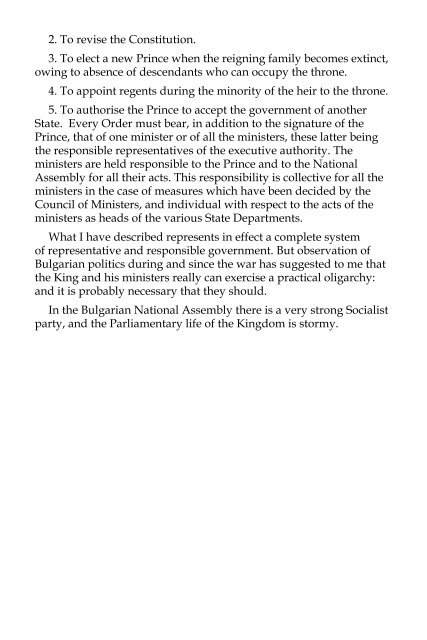Bulgaria e-book - iMedia
Bulgaria e-book - iMedia
Bulgaria e-book - iMedia
Create successful ePaper yourself
Turn your PDF publications into a flip-book with our unique Google optimized e-Paper software.
2. To revise the Constitution.<br />
3. To elect a new Prince when the reigning family becomes extinct,<br />
owing to absence of descendants who can occupy the throne.<br />
4. To appoint regents during the minority of the heir to the throne.<br />
5. To authorise the Prince to accept the government of another<br />
State. Every Order must bear, in addition to the signature of the<br />
Prince, that of one minister or of all the ministers, these latter being<br />
the responsible representatives of the executive authority. The<br />
ministers are held responsible to the Prince and to the National<br />
Assembly for all their acts. This responsibility is collective for all the<br />
ministers in the case of measures which have been decided by the<br />
Council of Ministers, and individual with respect to the acts of the<br />
ministers as heads of the various State Departments.<br />
What I have described represents in effect a complete system<br />
of representative and responsible government. But observation of<br />
<strong>Bulgaria</strong>n politics during and since the war has suggested to me that<br />
the King and his ministers really can exercise a practical oligarchy:<br />
and it is probably necessary that they should.<br />
In the <strong>Bulgaria</strong>n National Assembly there is a very strong Socialist<br />
party, and the Parliamentary life of the Kingdom is stormy.<br />
Chapter XII<br />
The Future of <strong>Bulgaria</strong><br />
It is impossible, in my opinion, to doubt the future of <strong>Bulgaria</strong>. The<br />
disasters of 1914 would seem to suggest that the <strong>Bulgaria</strong>n nation<br />
was without the moral balance to withstand the intoxication of<br />
victory. But whilst the events of that unhappy year showed the lack<br />
of that balance, the fault was with the leaders of the people rather<br />
than with the people themselves.<br />
The misfortune of <strong>Bulgaria</strong> in this generation of the nation’s<br />
life—a misfortune which is being rapidly repaired—is that she has no<br />
middle class: and no class with any “tradition” of leadership behind<br />
it. There are the peasants—admirable material for nation-making—<br />
heroic, thrifty, moral, industrious, practical. Above the peasants<br />
there is no class from which to draw a good supply of competent<br />
administrators, law-makers, officers, professional men. The peasant<br />
has his own limited capacities for leadership; but they are limited. I<br />
have encountered him frequently as Mayor of some little commune,<br />
as captain of an infantry regiment, and admired his administrative<br />
abilities, within a narrow and familiar scope, exceedingly. But the<br />
peasant does not go higher than that. It is the son of the peasant<br />
with some extra gift of cleverness who is “given an education,”<br />
who becomes legislator, official, cleric, diplomat. In many cases he<br />
does not take his polish well. Advanced education for the ambitious<br />
Balkan lad has in the past generally meant education abroad; and<br />
in Paris or Vienna or Petrograd the young <strong>Bulgaria</strong>n, plunged into<br />
an altogether new life of luxury and of frivolity, often suffered a<br />
loss of natural strength of fibre for which no <strong>book</strong>-learning could<br />
compensate.<br />
That evil will pass away. It is now possible to get a fairly advanced<br />
liberal education without going beyond <strong>Bulgaria</strong>. Also the people<br />
are becoming more immune to the effects of Western civilisation.<br />
Measles is a dangerous, indeed generally fatal, disease in countries<br />
to which it is first introduced. But in time immunity comes to<br />
make it almost harmless. <strong>Bulgaria</strong>’s material for a modern national<br />
organisation is being quickly improved by the upgrowth of a middle<br />
class whose sons will be able to keep their <strong>Bulgaria</strong>n qualities even<br />
under the circumstances of life in Paris or other great modern city. In<br />
future, then, the courage of the people is likely to have a wiser, more





